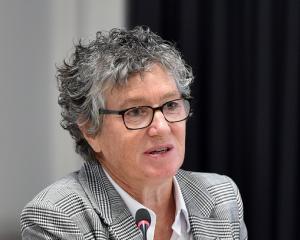
At yesterday’s Water Services Entities Bill select committee hearings, in Dunedin, Mr Cadogan implored members of Parliament to take ownership of the process.
"This is central government’s baby and councils are getting sick and tired of changing the nappies.
"The only thing worse than last year’s advertising campaign is the deafening silence that is emanating out of Wellington over the last six months.
"Councils are getting shredded."
Making a personal submission to the six-member subcommittee of the select committee on the Bill yesterday, Mr Cadogan told Taieri Labour MP Ingrid Leary the exacerbation of issues through misinformation was "ghastly" at present.
"It’s bloody impossible right at the moment to sit down and have a factual conversation and I don’t know whether we will ever be able to do that."
Further, there was a certain sector of society that was "hellbent and determined to stay confused", because it suited them.
Quite worrying extremes with a racist undertone were developing, he said.
After its first reading, the Bill which establishes four water services entities for New Zealand and contains ownership, governance and accountability provisions was opened to public submissions.
Hearings were held in Auckland yesterday as well as Dunedin, where private individuals, rural water scheme operators and southern councils presented for nearly four hours on a wide range of issues.
Invercargill deputy mayor Nobby Clark said he was leaving issues of ownership and co-governance to one side yesterday.
The Invercargill City Council had the highest credit rating possible for a council, low debt, solid infrastructure and money set aside for the future, he said.
Yet areas facing massive growth such as Queenstown and Wanaka would see investment — as could South Dunedin because of the climate change issues it faced — he said.
"We are worried that we will end up subsidising growth elsewhere on the South Island.
"We would opt out if we could."
Waitaki Mayor Gary Kircher noted the Waitaki District Council had been putting aside funding for renewals or upgrades of Three Waters infrastructure for the past 20 years.
Moreover, before that money was required, it could be loaned out to community organisations for the improvement of the district.
The council was also concerned it would lose critical staff, he said.
If, as had been suggested, the council was still responsible for aspects of stormwater, "all of our specialists in pipes and pumps and so forth are going to be gone".
The past month alone showed the district’s susceptibility to flooding with communities such as Otematata and Omarama inundated.
"We need to make sure that either the entities are going to deliver the stormwater services or that we’ve got the capability or capacity to do that."
In a written submission last week, Dunedin Mayor Aaron Hawkins said the Dunedin City Council shared some of the goals of the Government, but fundamentally opposed the service delivery model proposed; the haste with which the Bill was being progressed through Parliament; and the present lack of detail.
"It is difficult to provide a submission on the Bill because so much detail is not yet available."
Mr Hawkins will also speak to the full committee meeting in Wellington regarding the DCC's submission, via Zoom, on August 31.
Yesterday, select committee member Dunedin National list MP Michael Woodhouse said he believed extreme views had entered the reforms debate because there was an absence of clear answers to basic questions.












